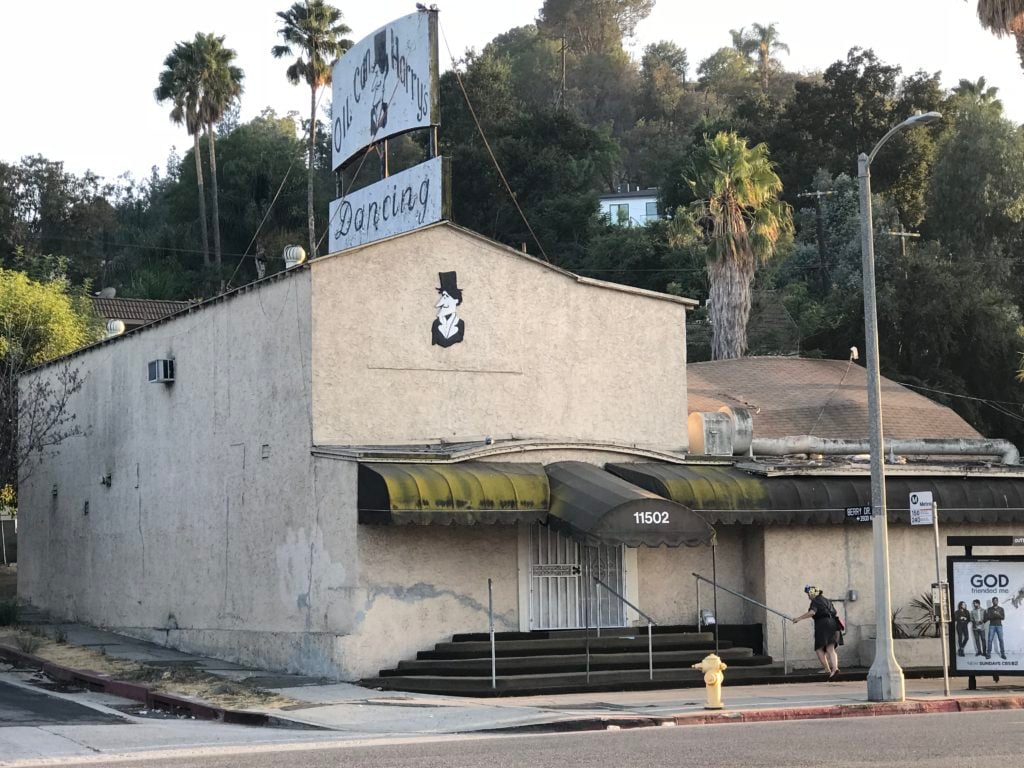
Oil Can Harry’s, seen here on Aug. 25, 2018, was the oldest gay club in Los Angeles. It opened in 1968. A process is underway to have the building designated as a cultural and historic monument. Photo: Q Voice NEws
Will Oil Can Harry’s become only the third LGBTQ space in Los Angeles to be officially recognized for its vital significance to the city’s history?
The venerable Studio City landmark opened in 1968 and closed in January. At 52 years old, Oil Can Harry’s was the longest continually operating nightclub in Los Angeles.
Oil Can Harry’s vital to history
While the building’s architecture might not be classified as significant, the club’s social and cultural importance to the LGBTQ community is exceptional. It was a place where people formed community and formed friendships. It was a safe space.
Los Angeles City Councilman Paul Kerkorian, whose District 2 includes Studio City, has initiated the process of having the former home of Oil Can Harry’s designated a cultural and historic monument.
“I’ve always known about the venue and its historical significance,” Kerkorian said in a recent interview. “I love recognizing the history of the San Fernando Valley. It’s important to me. It’s important to mark those places. Change can happen quickly, and we can lose track of the history quickly.”
In addition, the property is identified in Survey LA, the city’s historic resources survey, as a resource directly associated in the “development of LGBT consciousness, community or culture during the period of significance evaluated, Ethnic and Gender Equality, 1942-1980.”
Jewel Thais-Williams opened L.A.’s 1st gay black nightclub Jewel’s Catch One
Nomination procedure
In April, the city council unanimously approved Kerkorian’s motion to initiate consideration of the former club as a historic-cultural monument.
On Tuesday, the city’s Planning and Land Use Committee also unanimously approved considering the idea.
The item will go back to the council for a procedural approval June 23.
Once the council approves the motion, the City’s Planning Department will prepare the historic-cultural monument application for review and consideration by the Cultural Heritage Commission.
The application is a comprehensive document that will look at the entire history of the property and the Oil Can Harry’s building, with a focus on the historic and cultural merits related to the LGBTQ community. Preparation of the document could take from 30 to 60 days.
The Commission will then hold a hearing and conduct a comprehensive investigation of the building and its significance to cultural and societal history in the city.
The commission will submit its report back to the council.
Ex L.A. City Councilman Tom LaBonge helped demolish Circus Disco
Other historic LGBTQ sites
In 2008, the building that once housed the Black Cat (the famous smiling black cat face sign still graces the location) was the first LGBTQ site declared a historic cultural monument.
Four years later, The Cove Avenue stairway, east of the Silver Lake reservoirs, was recognized as the second LGBTQ historic site and dedicated to the Mattachine Society, the pioneering gay rights group founded by Harry Hays in 1952. It’s now called “The Mattachine Steps.”
The stairway is near Hays’ former residence and location for the group’s first secret meeting on Nov. 11, 1950.
